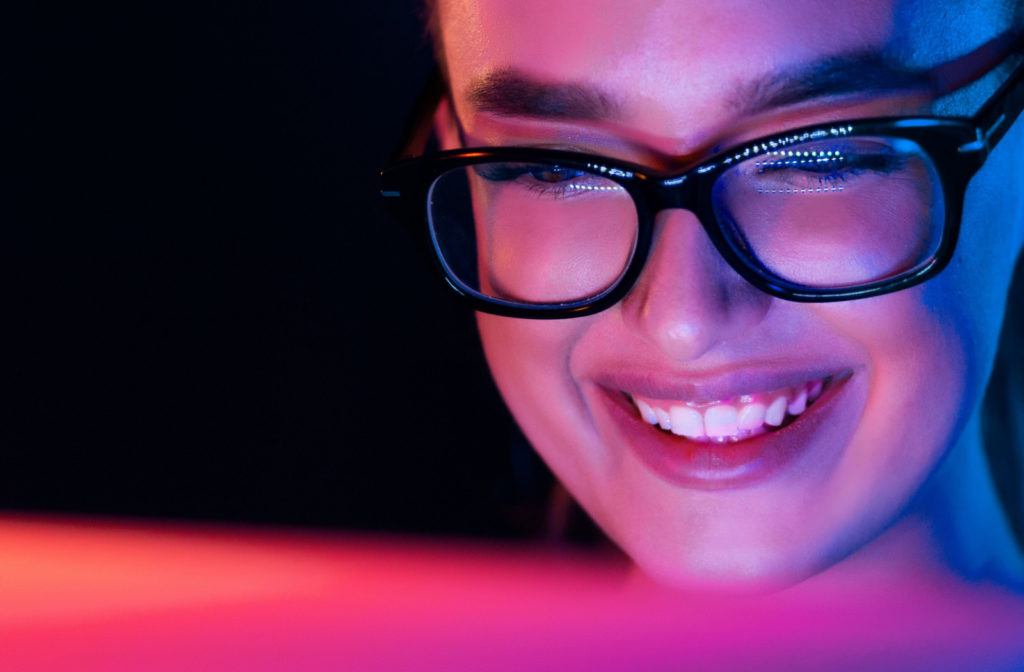It’s almost impossible to avoid blue light in your daily life. It’s emitted by the sun, digital devices, LED screens and lights—it’s all around us almost all the time. Since it can affect our circadian rhythm, many optometrists and researchers have looked for ways to reduce the effects of blue light on our eyes—like blue light glasses. But how often can you wear these glasses?
If you always want to wear blue light glasses, you can.
Blue light glasses use a special filter that reduces how much blue light reaches your eyes, which can help reduce its effects. However, they may only be suitable for some daily situations. If you’re worried about the impact of blue light, you should speak with your optometrist and see if they can recommend a solution to reduce how much blue light affects you daily.
Blue Light: What Is It?
Blue light is a short, high-energy wave on the visible spectrum and is primarily emitted by the sun. However, it’s also emitted by digital screens, plasma displays, and other forms of LED or fluorescent lights. As technology becomes more integral to our daily lives, we’re more exposed to blue light than ever.
Blue light has several effects on the human body. Our bodies have adapted to respond to blue light with alertness and awakeness to remain productive during the day.
Now that we’re exposed to more blue light through screens, lights, and digital devices, research is being done to determine if this increased exposure has any adverse side effects.
The Effects of Blue Light on the Human Eye
Blue light exposure isn’t necessarily a bad thing. Since it helps us wake up and stay awake during the day, it provides many benefits, like:
- Boosting cognitive function
- Making you more alert
- Regulating your natural circadian rhythm
- Boosting metabolism
There can be a negative effect, however. Blue light suppresses melatonin production—the natural chemical that helps you sleep at night—to promote awakeness and alertness, disrupting your natural circadian rhythm and causing fatigue.
It can also cause eye strain. As you use devices or stare at screens for extended periods, you tend to blink less, leading to other uncomfortable symptoms—though it’s not quite a direct result of blue light.
How to Reduce the Effects of Blue Light
Even though blue light can disrupt sleep patterns, it isn’t always avoidable, especially in today’s technology-focused age, which has led researchers and optometrists to design several solutions to reduce the effects of blue light on the body. These include:
- Avoiding screen usage in the hours before you sleep
- Reducing screen time during the day where possible
- Using an eye comfort shield (if the device has the option)
Fortunately, there’s also one commonly-suggested solution that may be able to help: blue light glasses.

What Are Blue Light Glasses?
Blue light glasses, also known as blue light-blocking glasses or computer glasses, are specialized eyewear offered in prescription and non-prescription forms. These glasses utilize a special filter, amber tint, or coating to stop most blue light from reaching your eye. They often give your environment a yellow or amber hue as you see less blue.
Many people find that these glasses make extended screen time more comfortable. They can also be beneficial outdoors to reduce the amount of blue light you’re exposed to from the sun, or even inside if you work in an environment with many LED lights.
When Should You Wear Blue Light Glasses?
You can wear blue light glasses whenever you choose and for as long as you like. However, just because you can wear them all the time doesn’t mean you should. It’s important to remember that these glasses stop a specific light wavelength from reaching your eyes and change the colour of your environment.
This can be problematic for people who work in a field where they need to determine the distinction between different colours and shades accurately. For example, painters or graphic designers may find these glasses interfere with their ability to do their job. Consider alternatives, like task-specific glasses, if you need to see colours accurately.
Task-specific glasses are designed to optimize your comfort when performing a specific task. They have some similar features to blue light glasses but tend to focus on providing other features, like:
- Using specialized coatings or tints to provide optimal vision at a certain distance
- Reducing glare from screens or lights
- Improving contrast to make it easier to see clearly
- Reducing brightness with specific tints
Where to Get Blue Light Glasses
If you’re interested in blue light glasses, your first step should be to visit your optometrist. They can perform a comprehensive eye exam and give you advice and suggestions for blue light glasses. With their years of experience and training, they can answer your questions about blue light and help you find a solution.At LMC Optometry and Eye Care, we know that technology is an integral part of everyone’s lives, and we’re here to help you minimize blue light’s impact on your life. To speak with a caring and experienced professional, schedule an appointment with us today!



